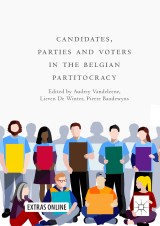Details

Candidates, Parties and Voters in the Belgian Partitocracy
|
CHF 142.00 |
|
| Verlag: | Palgrave Macmillan |
| Format: | |
| Veröffentl.: | 03.11.2018 |
| ISBN/EAN: | 9783319964607 |
| Sprache: | englisch |
Dieses eBook enthält ein Wasserzeichen.
Beschreibungen
This book focuses on the triadic relationship between electoral candidates and the two other poles of the delegation and accountability triangle—political parties and voters. The chapters rely mostly on the Belgian Candidate Survey (CCS project), gathering about 2000 candidates belonging to 15 parties represented in Parliament and running for the 2014 federal and regional elections, and the authors’ conclusions serve at answering broad political science questions linked with elite recruitment, party and candidate electoral strategies, personalisation, party cohesion, and descriptive and substantive representation. Its multilevel semi-open electoral system, atypical federal structure, extreme party system fragmentation and volatility make Belgium an exceptionally rich but complex case that offers findings highly relevant to research on candidates in other democracies.
<div>1. Introduction. Candidates Between Parties and Voters: A Triadic Relationship in the Belgian Partitocracy.- 2. The Effects of the Political Parties’ Selective Filter Bias on Descriptive Representation: Analysis of the Candidates’ Sociological and Political Background.- 3. The More, the Smoother? Candidate Selection and Intraparty Competition.- 4. Who Wins More? Understanding Preferential Voting by Means of Context and Candidates’ Background and Campaigning.- 5. The Puzzle of Personalization of Politics: Evidence From Candidate Campaigns in Belgium 2007–2014.- 6. Campaigning and Candidates: Different Strategies for Different Candidates.- 7. The Electoral Impact of Local Campaigning in the 2014 Regional and Federal Elections.- 8. Constituting the List Amid Time of Personalization of Politics: The Balance of Congruent and Popular Candidates in Belgian Political Parties.- 9. Who Do You Feel and What Future Do You Want for Belgium? A Comparison of Candidates and Voters’ Identities and Institutional Preferences.- 10. From More or Less Integration to Status Quo? Explaining Candidates’ and Citizens’ Attitudes Towards European Integration.- 11. Between Parties and Voters: Candidates’ Role Conception in the Belgian Partitocracy.- 12. Critical Candidates: Elite Attitudes Towards the Functioning of Representative Democracy.- 13. Conclusion. Studying Candidates, Parties and Voters. Lessons Learned and New Questions.</div>
<div><div><b>Audrey Vandeleene</b> is Researcher in the Department of Political Science at Lund University, Sweden.</div><div><br></div><div><b>Lieven De Winter</b> is Senior Professor of Political Science at the Centre of Political Science and Comparative Politics (CESPOL), Université Catholique de Louvain, Belgium.</div><div><br></div><div><b>Pierre Baudewyns</b> is Professor of Political Science at the Centre of Political Science and Comparative Politics (CESPOL), Université Catholique de Louvain, Belgium.</div></div><div><br></div><div><br></div>
A black box in the study of representation in European democracies is our knowledge about elected but also unelected candidates. What is their background? How are they recruited? What are their campaign aims, strategies, resources and tools? How do they relate to their (constituency and central) party and their voters? How do they consider democratic governance at national and European levels? This book focuses on the triadic relationship between candidates and the other poles of the delegation and accountability triangle: political parties and voters. The chapters rely mostly on the Belgian Candidate Survey (CCS project) gathering about 2000 candidates belonging to 15 parties running for the 2014 federal and regional elections. Most conclusions do not hold only for the Belgian partitocracy but answer broad political science questions on elite recruitment, electoral strategies, personalisation, party cohesion, and descriptive and substantive representation. Its multilevel semi-open electoral system, atypical federal structure, and extreme party system fragmentation make Belgium a rich but complex case offering findings highly relevant to research on candidates in other democracies.<div><br></div><div><b>Audrey Vandeleene</b> is Researcher in the Department of Political Science, Lund University, Sweden.</div><div><br></div><div><b>Lieven De Winter</b> is Senior Professor of Political Science at the Centre of Political Science and Comparative Politics (CESPOL), Université Catholique de Louvain, Belgium.</div><div><br></div><div><b>Pierre Baudewyns</b> is Professor of Political Science at the Centre of Political Science and Comparative Politics (CESPOL), Université Catholique de Louvain, Belgium.</div><div><br></div>
Analyses the variations of Belgian candidates’ political and socio-demographic background, campaign behaviour towards voters and parties, and policy views Digs into the triadic delegation and accountability relationship between candidates, voters, and parties Based on rich data from the Belgian Candidate Survey 2014
Analyses the variations of Belgian candidates’ political and socio-demographic background, campaign behaviour towards voters and parties, and policy views<div><div><div>Digs into the triadic delegation and accountability relationship between candidates, voters, and parties</div></div></div><div><div>Is based on rich data from the Belgian Candidate Survey 2014</div></div>
“This book successfully frames the triadic relationship between candidates, voters and parties within the principal–agent theory by making theoretically relevant the distinction between realistic and non-realistic candidates and by approaching the Belgian multilevel elections of May 2014 as a comparative test. It greatly improves our knowledge on political representation.” (Paolo Segatti, University of Milan, Italy)<p>“This book is a major and timely contribution to the important and growing field of studies about democratic representation. The authors cover important dimensions of the triadic link between voters, parties and candidates that help explain differences and similarities in candidates’ background, campaign activities, policy congruence and views on representation and democracy.” (Eva H. Önnudóttir, University of Iceland, Iceland)</p>
Diese Produkte könnten Sie auch interessieren:

Staat ohne Verantwortung?

von: Ludger Heidbrink, Alfred Hirsch, Simon Critchley, Pascal Delhom, Nancy Fraser, Volker Gerhardt, Christoph Hubig, Wolfgang Kersting, Helmut Klages, Tobias Nikolaus Klass, Werner Krawietz, Karl Heinz Ladeur, Renate Mayntz, Richard Münch, Julian Nida-Rümelin, Emmanuel Richter, Gunnar Folke Schuppert, Robert Spaemann, Werner Stegmaier, Michel Vanni

CHF 40.00
















